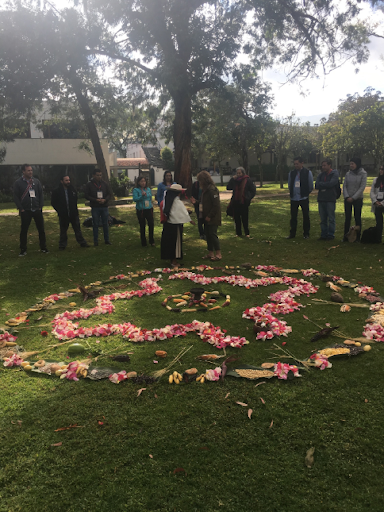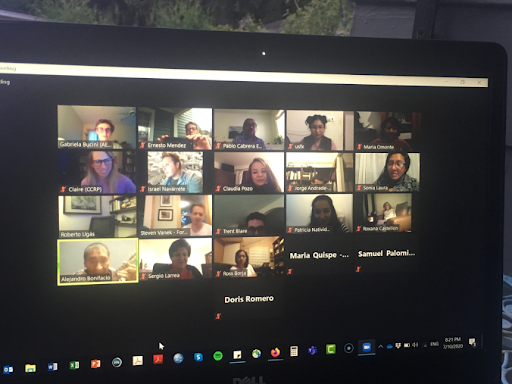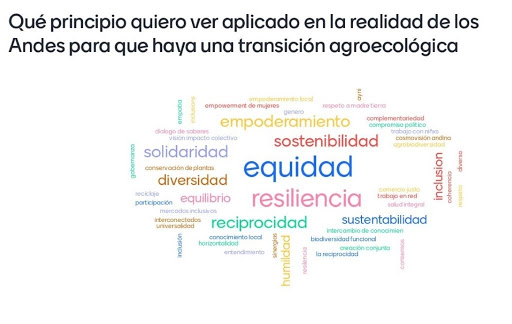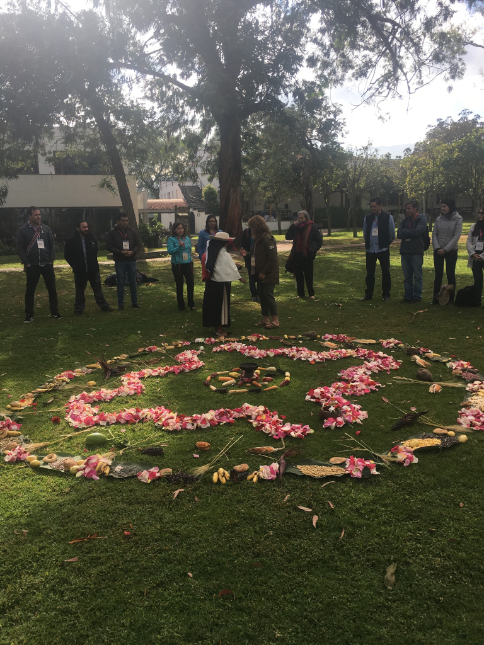BLOG: In the Vibrancy of the 16th Annual Meeting of the Andes Community of Practice / En la Vivacidad de la 16ª Reunión Anual de la Comunidad de Práctica de los Andes
By/Por: Gabriela Bucini, Ernesto Méndez, Nils McCune and Amaya Carrasco (Agroecology Support Team/Equipo de Apoyo en Agroecología)
When we imagine the Andes, we see majestic peaks and a vibrant texture of landscapes and cultures. Bolivia, Ecuador and Peru are the three countries where the projects of the Collaborative Crop Research Program (CCRP), funded by the McKnight Foundation, work together as a community of practice (CoP). The CoP is formed by local NGOs, research centers and other associations, which directly work with smallholder farmers. Central to the activities of the Andes CoP is to support producers who wish to orient their farms towards agroecology, conserving soil health, enhancing agricultural biodiversity and integrating different knowledge systems, including indigenous knowledge and western scientific methods.

Every year, in an invigorating atmosphere of friendship and collaboration, the Andes CoP gathers in one of the three countries to exchange insights and discuss new and lifelong questions that kindle the research of the CoP across farms and communities. This year, due to the COVID-19 pandemic, the 16th conference of Andes CoP took place online. Yasmin Jalil and Sergio Larrea aptly organized the online system, supported by the CoP organising committee and the regional team composed by Claire Nicklin, Roberto Ugas and Carlos Barahona. Yasmin and Sergio facilitated the conference, and the animated and keen group, was able to instill life to two weeks of high-quality content. This included seminars, thematic groups, open spaces for discussion and planning, presentations of advances in GIS mapping, as well as a new session dedicated to agroecology fellows.
Agroecology is at the core of the CCRP program’s commitment to support an ecologically sound and socially just transition of the Andean food system. The CCRP’s interest is particularly directed to collaborative agroecological research and knowledge-sharing, aimed at strengthening the capacities of farmer groups, research institutions and development organizations. The Agroecology Support Team (AES) includes Ernesto Méndez, Gabriela Bucini and Nils McCune, of the Agroecology and Livelihoods Collaborative (ALC), at the University of Vermont (UVM). AES seeks to deepen the agroecological knowledge of the program participants and assists in research and co-learning that supports a transition towards agroecological systems.
Ernesto, Nils and Gabriela participated at the Andes CoP16 and facilitated a dialogue around agroecological transitions. The two sessions entitled “Reflexión sobre Agroecología en Los Andes” (Reflection on the agroecology in the Andes) provided fertile ground to collectively reflect on the current state and visions for the future of agroecology in the region. The AES team proposed questions for nine working groups aimed at bringing collective awareness around the values and principles that guide their work with Andean producers, and which are vital to create strength and cohesion in the agroecological journeys of the local communities.
Agroecological Visions for the Andean regions
What does it mean to be in an agroecological transition? Where are we starting and where do we wish to go? What principles guide us in the journey? The work of answering these questions and envisioning actions to start or to continue the agroecological transition were grounded in the CoP wisdom and experience. To catalyze the dialogue, Ernesto gave a presentation on agroecological principles and showed concrete examples of principles-based transitions in two farming systems of Vermont, U.S.A, where the ALC is located. His presentation encouraged the participants to note that agroecological principles have the depth to support real change and the width to reach different contexts and cultures in the world. These principles can hold meanings that overlap with indigenous principles, such as those of the Andean cosmovision, and can therefore be held together.
The visions for the regions of the Bolivia central plateau, the central zone of Peru and the central zone of Ecuador were shared in a plenary session. The themes spanned across the three dimensions of agroecology – science, practice and movement – with strong emphasis on the social, cultural, political and economic dimensions. Technical skills are important but need to be built within a participatory and sincere exchange of knowledge between indigenous farmers and technicians. The CoP visions wish to enhance the inclusion and legitimization of indigenous knowledge in the farming practices and in the schools, in order to strengthen the presence of local farmer organizations in the governance, to continue to work on women’s empowerment, equity and food sovereignty. Markets for agroecological and autonomous products and conscious consumers supported by short market chains are important for the future of farming in the regions. The visions call for responsible policies that account for the interests of local farmers, instead of supporting capitalistic and extractive farming and mining practices.
Agroecological components, such as agricultural biodiversity, seed conservation, ecological pest management, water conservation/management, soil health, risk management for climate change, and healthy nutrition are all part of the visions for agroecology in the Andes. The challenges of COVID-19 add a need for the health of the people with whom we interact. “Agroecology is a concept in construction at the scale of the individual, the family, the community and the territory”, said one participant. Another participant noted that “agroecology is a trajectory that is made on the base of principles but also on the base of the analysis of opportunities and threats in the current conjuncture.” When we look at the principles that will orient the journeys of the CoP, we find them in the integration of different knowledge systems and in particular the Andean cosmovision, which recognizes the connection of natural and human systems. The CoP emphasizes participatory and horizontal learning approaches based on trust, solidarity, respect, humility, cooperation, equity and inclusion at all levels. The collective action and complementarity of efforts that leverage the capacities and values of people can lead to a transformation not only of single individuals but also of families, farms, communities and ultimately, of food systems. Sovereignty is essential, the CoP recognizes, in the three dimensions: in the resources, the food and the individual choices.

What is missing for agroecology to be strong in these territories? Technical skills are necessary to improve research quality, but they need to also be supported by an agroecological approach that influences political economies, and more explicitly, national, regional and local policy. The principles of participation, co-learning and humility transform research by creating relationships of trust that empower all participants to work for change. A key challenge identified was the connection with consumers, both in rural and urban contexts. For a new agriculture based on indigenous and agroecological principles to thrive, it is necessary to educate and direct consumers towards healthy diets and a preference for traditional/local food ingredients. Influenced by consumers, markets can then also more directly support agroecological food systems. Another challenge is keeping local knowledge alive by integrating scientific and technical knowledge with indigenous knowledge, viewing them both on an equal basis. This process can start in schools where the new generations can be encouraged to apply local knowledge. Technology poses a more general challenge, according to some people in the CoP, which poses questions on who brings the technologies and how to make sure that it is appropriate for the local environment and culture.

Noches de cultura and a closing of a beautiful story
On Friday night, it was time to take out the musical instruments and warm up the voice. All are welcome to share their talents …both modest efforts, as well as the more experienced! The CoP Andes has wonderful musicians! The charango and the guitarra accompanied voices and brought many smiles through computer screens. Music and song bring people together in a special way and makes us feel close.
We close with a personal story illustrating the relationships that support the co-creation of agroecological knowledge, shared by Juan Torres from the project “Semillas y Escuelas” (“Seeds and Schools”). He often visits producers of his project and works with them in the fields. He shares his knowledge and learns from them. During a visit, he asked a producer what he wished. The producer said: “You always come to the field and get to know our environment and how we work. I’d like to come to where you work once and see how you learn and you work”. This led to an arrangement for the producer to go visit the campus of the Universidad Nacional Agraria La Molina in Lima, Peru. The producer enjoyed visiting the big library and the building where Juan works. A simple visit opened a new vision of science and generated more equity in the relationship. This story reminds us that an individual’s professional positionality and experience can become a place of learning and discovery for others, if we are open to listen and share. Equal interest in the technician/academic and the producer to share their knowledge can open new horizons and strengthen relationships for expanded learning.
………………………………………………………………………
En la Vivacidad de la 16ª Reunión Anual de la Comunidad de Práctica de los Andes
Cuando imaginamos los Andes, vemos majestuosas montañas y una textura vibrante de paisajes y culturas. Bolivia, Ecuador y Perú son los tres países en los cuales los proyectos del Programa Colaborativeo para la Investigación en Cultivos (CCRP, por sus siglas en Inglés), financiado por la Fundación McKnight, trabajan juntos como una Comunidad de Práctica (CdP). La CdP está formada por ONG locales, centros de investigación y otras asociaciones, que trabajan directamente con los pequeños agricultores. Un aspecto central de las actividades de la CdP de los Andes, es el apoyo a los productores que desean orientar sus granjas hacia la agroecología, conservando la salud del suelo, mejorando la biodiversidad agrícola y la integración de los diferentes sistemas de conocimiento, incluyendo conocimientos indígenas y los métodos científicos occidentales.

Cada año, en una atmósfera vigorizante de amistad y colaboración, la CdP de los Andes se reúne en uno de los tres países para intercambiar ideas y discutir nuevas ideas y cuestiones que persisten, y las cuales catalizan la investigación de la CdP en las granjas y comunidades. Este año, debido a la pandemia de COVID-19, la 16ª conferencia de la CdP de los Andes ocurrió en línea. Yasmin Jalil y Sergio Larrea, organizaron acertadamente el sistema en línea, con el apoyo del comité organizador de la CdP y el equipo regional compuesto por Claire Nicklin, Roberto Ugas y Carlos Barahona. Yasmin y Sergio facilitaron la conferencia, y el animado y entusiasta grupo, pudo dar vida a dos semanas de seminarios de alta calidad, grupos temáticos, espacios abiertos para el debate y la planificación, presentaciones de los avances en la cartografía con SIG, así como una nueva sesión dedicada a los becarios de agroecología.
La agroecología es la base del compromiso del programa de la CCRP de apoyar una transición en el sistema alimentario andino, de manera ecológica y socialmente justa. El interés de la CCPR está dirigido en particular a la investigación agroecológica en colaboración y al intercambio de conocimientos, con el fin de fortalecer la capacidad de los grupos de agricultores,y a las instituciones de investigación y organizaciones de desarrollo. El Equipo de Apoyo en Agroecología (AES, por sus siglas en Inglés), integrado por Ernesto Méndez, Gabriela Bucini y Nils McCune, del Colaborativo y Medios de Vida (ALC, por sus siglas en Inglés), de la Universidad de Vermont (UVM), busca profundizar los conocimientos agroecológicos de los participantes en el programa y prestar asistencia en la investigación y el aprendizaje conjunto que apoye a la transición hacia sistemas agroecológicos.
Ernesto, Nils y Gabriela participaron en la CdP16 de los Andes y facilitaron un diálogo en torno a las transiciones y transformaciones agroecológicas. Las dos sesiones tituladas “Reflexión sobre Agroecología en Los Andes” proporcionaron un terreno fértil para reflexionar colectivamente sobre el estado actual y las visiones para el futuro de la agroecología en la región. El equipo AES propuso preguntas para nueve grupos de trabajo con el fin de crear una conciencia colectiva en torno a los valores y principios que guían su trabajo con los productores andinos, y que son vitales para crear fuerza y cohesión en los recorridos agroecológicos de las comunidades locales.
Visiones agroecológicas para las regiones andinas
¿Qué significa estar en una transición agroecológica? ¿Dónde estamos empezando y a dónde queremos ir? ¿Qué principios nos guían en el viaje? La labor de responder a estas preguntas y prever medidas para iniciar o continuar la transición agroecológica se basó en la sabiduría y la experiencia de la CdP. Para catalizar el diálogo, Ernesto hizo una presentación sobre los principios agroecológicos y mostró ejemplos concretos de transiciones basadas en principios en dos sistemas agrícolas de Vermont, Estados Unidos, donde se ubica el ALC. Su exposición alentó a los participantes a observar que los principios agroecológicos tienen la profundidad necesaria para apoyar un cambio real y la amplitud necesaria para llegar a diferentes contextos y culturas del mundo. Estos principios pueden tener significados que se alinean con los principios indígenas, como los de la cosmovisión andina, y por lo tanto pueden mantenerse unidos.
Las visiones para las regiones del altiplano central de Bolivia, la zona central del Perú y la zona central del Ecuador se compartieron en una sesión plenaria. Los temas abarcaron las tres dimensiones de la agroecología -ciencia, práctica y movimiento- con un fuerte énfasis en las dimensiones sociales, culturales, políticas y económicas. Los conocimientos técnicos son importantes, pero es necesario crearlos en el marco de un intercambio participativo y sincero de conocimientos entre los agricultores y técnicos indígenas. Las visiones de la CdP desean mejorar la inclusión y la legitimación de los conocimientos indígenas en las prácticas agrícolas y en las escuelas, fortalecer la presencia de las organizaciones locales de agricultores en la gobernanza y seguir trabajando en el empoderamiento de la mujer, la equidad y la soberanía alimentaria. Los mercados de productos agroecológicos y autónomos y los consumidores conscientes apoyados por cadenas de mercado cortas son importantes para el futuro de la agricultura en las regiones. Las visiones exigen políticas responsables que tengan en cuenta los intereses de los agricultores locales, en lugar de apoyar las prácticas agrícolas y mineras capitalistas y extractivas.

Los componentes agroecológicos, tales como la biodiversidad agrícola, la conservación de semillas, el manejo ecológico de plagas, la conservación/gestión del agua, la salud del suelo, la gestión de los riesgos del cambio climático y la nutrición saludable forman parte de las visiones de la agroecología en los Andes. Los desafíos de COVID-19 añaden una necesidad de cara a la salud de las personas con las que interactuamos. “La agroecología es un concepto en construcción a escala del individuo, la familia, la comunidad y el territorio”, dijo un participante. Otro participante señaló que “la agroecología es una trayectoria que se realiza sobre la base de principios, pero también sobre la base del análisis de oportunidades y amenazas en la coyuntura actual”. Cuando miramos los principios que orientarán los recorridos de la CdP, los encontramos en la integración de diferentes sistemas de conocimiento y en particular la cosmovisión andina, la cual reconoce la conexión de los sistemas naturales y humanos. La CdP hace hincapié en los enfoques de aprendizaje participativos y horizontales basados en la confianza, la solidaridad, el respeto, la humildad, la cooperación, la equidad y la inclusión en todos los niveles. La acción colectiva y la complementariedad de los esfuerzos que aprovechan las capacidades y los valores de las personas pueden conducir a una transformación, no sólo de las personas individuales, sino también de las familias, las granjas, las comunidades y, en última instancia, de los sistemas alimentarios. La soberanía es esencial, según la CdP, en tres dimensiones: en los recursos, en los alimentos y en las opciones individuales.

¿Qué falta para que la agroecología sea fuerte en estos territorios? Los conocimientos técnicos son necesarios para mejorar la calidad de la investigación, pero también deben estar respaldados por un enfoque agroecológico que influya en las economías políticas y, más explícitamente, en la política nacional, regional y local. Los principios de participación, co-aprendizaje y humildad transforman la investigación al crear relaciones de confianza que facultan a todos los participantes para trabajar en pro del cambio. Un desafío clave identificado fue la conexión con los consumidores, tanto en contextos rurales como urbanos. Para que prospere una nueva agricultura basada en principios indígenas y agroecológicos, es necesario educar y orientar a los consumidores hacia dietas saludables y una preferencia por los ingredientes alimentarios tradicionales/locales. Influenciados por los consumidores, los mercados también pueden apoyar más directamente los sistemas alimentarios agroecológicos. Otro desafío es mantener vivos los conocimientos locales mediante la integración de los conocimientos científicos y técnicos con los conocimientos autóctonos, considerando a ambos en pie de igualdad. Este proceso puede comenzar en las escuelas, donde se puede alentar a las nuevas generaciones a aplicar los conocimientos locales. La tecnología plantea un desafío más general, según algunas personas de la CdP, que plantea cuestiones sobre quién aporta las tecnologías y cómo asegurarse de que son apropiadas para el medio ambiente y las culturas locales.

Noches de cultura y una hermosa historia final
El viernes por la noche, era el momento de sacar los instrumentos musicales y calentar la voz. Todos son bienvenidos y bienvenidas a compartir sus talentos… ¡Los principiantes y los más experimentados! ¡La CoP Andes tiene músicos maravillosos! El charango y la guitarra acompañaron a las voces y trajeron muchas sonrisas a través de las pantallas de las computadoras. La música y el canto unen a la gente de una manera especial y nos hace sentir cercanos.
Cerramos con una historia personal que ilustra las relaciones que apoyan la co-creación del conocimiento agroecológico, compartida por Juan Torres del proyecto “Semillas y Escuelas”. Él visita a menudo a los productores y trabaja con ellos en los campos. Comparte sus conocimientos y aprende de ellos. Durante una visita, preguntó a un productor qué deseaba. El productor dijo: “Siempre vienes al campo y conoces nuestro entorno y cómo trabajamos. Me gustaría venir a donde trabajas una vez y ver cómo aprendes y trabajas”. Así que arreglaron que el productor fuera a visitar el campus de la Universidad Nacional Agraria La Molina en Lima, Perú. El productor disfrutó visitando la gran biblioteca y el edificio donde trabaja Juan. Una simple visita abrió una nueva visión de la ciencia y generó más equidad en la relación. Esta historia nos recuerda que la posición profesional y la experiencia de un individuo puede convertirse en un lugar de aprendizaje y descubrimiento para otros, si estamos abiertos a escuchar y compartir. El mismo interés en que el técnico/académico y el productor compartan sus conocimientos puede abrir nuevos horizontes y fortalecer las relaciones para un aprendizaje más amplio.


Thanks to ALC for an excelent synthesis of the last CoP16 meeting. The title of so accurate.
Que hermoso, las culturas agrícolas andinas unidas. Ciertamente los conocimientos técnicos son importantes pero siempre esparciéndolos dentro del marco participativo y de unión comunitaria.
Muy interesante el post.Les felicito. Es importante la profesionalidad bioetica de los profesionales sanitarios. Hoy en dia tenemos excelentes directorios con miles de profesionales medicos y sanitarios como https://www.quemedico.com con opiniones de sus propios pacientes, son realmente útiles para poder elegir al mejor profesional sanitario de cualquier especialidad medica